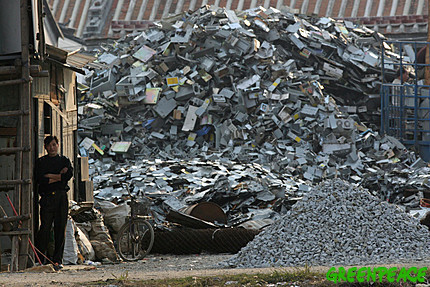Greenpeace: 'Nintendo needs to do more'
Bottom-rated Nintendo must improve, Greenpeace tells TechRadar

Following our earlier report that Nintendo hits back at Greenpeace’s “Playing Dirty” report on the environmental impact of games consoles, Greenpeace continues to claim that the Japanese gaming giant still needs to do more to improve its abysmal rating in the 'Guide to Greener Electronics'
TechRadar spoke with Dr. Kevin Brigden at the Greenpeace Science Unit at Exeter University who told us:
“For Nintendo to say we have no public policies and that they meet the legal minimum requirements of the EU directive on restriction of hazardous substances in electrical and electronic equipment seems a little ludicrous.”
“What is more, even the EU is now recognising that RoHS doesn't cover everything that it needs to cover,” added Dr Brigden.
What should Nintendo do?
If Greenpeace claims that it is disingenuous for Nintendo to continue to refuse to engage with the environmental campaign group, what would they recommend that the Japanese games company do to increase their rating in the 'Guide to Greener Electronics'?
“Firstly, their chemicals policy – we want to know what their policies are on these. What are they doing beyond the legal minimum to ensure their products don't contain hazardous chemicals?” said Dr. Brigden
Get daily insight, inspiration and deals in your inbox
Sign up for breaking news, reviews, opinion, top tech deals, and more.
“Secondly, ‘producer responsibility’ - meaning their responsibility to tackle electronic waste. This should ideally be tackled through a global take-back policy. Nintendo has no policy on take-back that we can find on their websites or anywhere else,” said Dr.Brigden.
“Note that this does need to be free takeback. The idea being that companies need to be responsible for their own waste, as that will then feed back into their own policicies regarding use of toxic chemicals,” he explained.
Hazardous Toys
In future rankings Greenpeace also plans to focus more on energy use, something which could well gain Nintendo an environmental plus point, as the Wii manufacturer is clearly ahead of Sony and Microsoft in this area.
“Certainly the Nintendo Wii uses far less energy than the Xbox 360 and PS3,” said Dr.Brigden.
“What is also interesting is that Nintendo says that it also meets EU requirements for toys, which it doesn't need to do by law, but it is good to see that they are raising the issue that the current classifications that apply to consoles are in need of revising.”
“Unacceptable levels of thalates, which are chemicals added into plastics such as PVC to make them flexible were found in the Xbox 360 and PS3. Were games consoles classified as toys by the EU, which they currently are not, then the Xbox 360 and PlayStation 3 would be illegal for sale in Europe.”
Unregulated electronic waste
Most worryingly, Dr. Brigden informed us that a massive 75% of electronic waste in the EU is currently unaccounted for.
“A large amount of this is ending up in unregulated recycling yards in India and China, which leads to extensive environmental damage.
“There is a huge illegal trade in electronic waste, we don't know the scale of it, but we know that it is substantial.”
